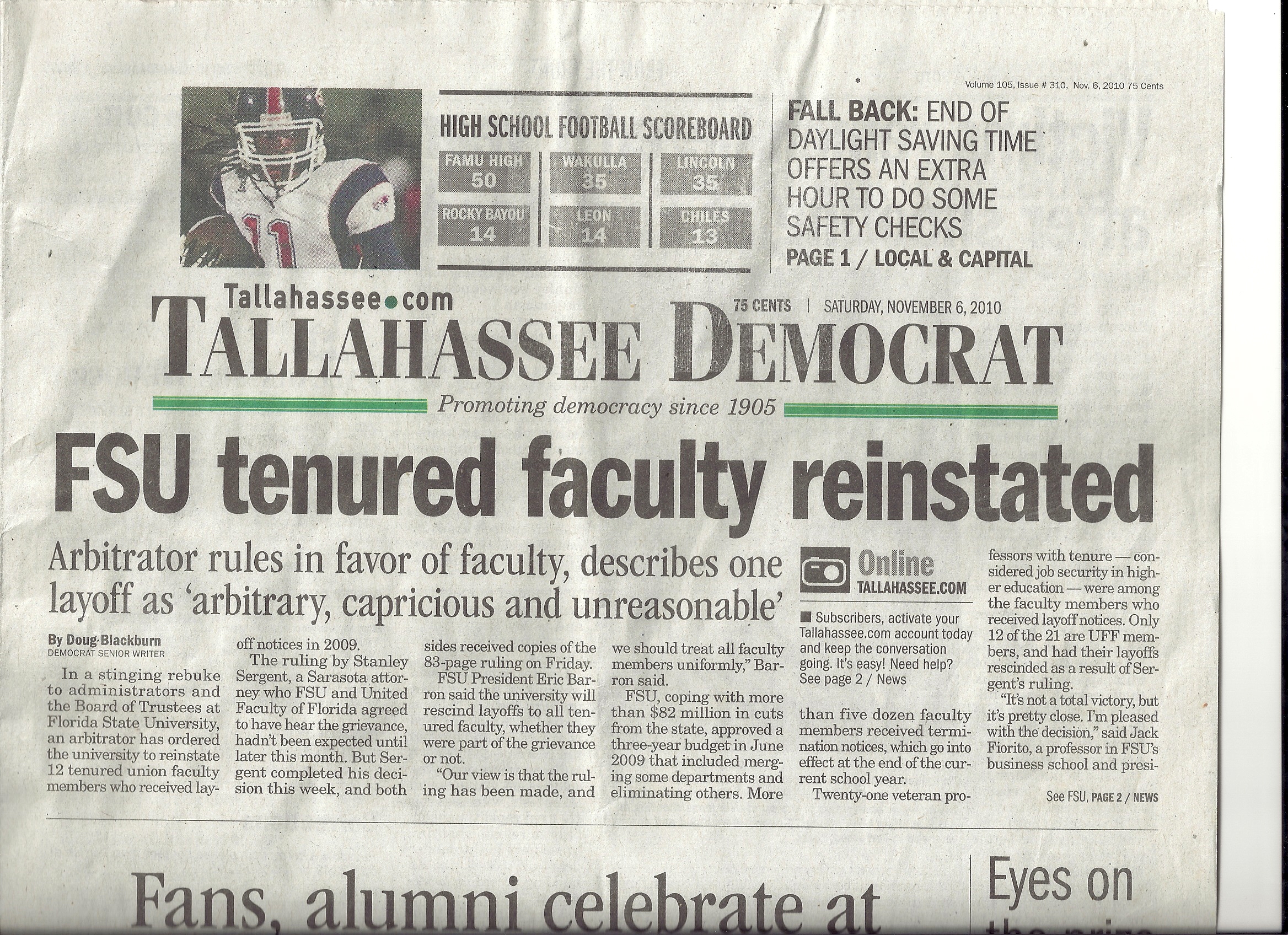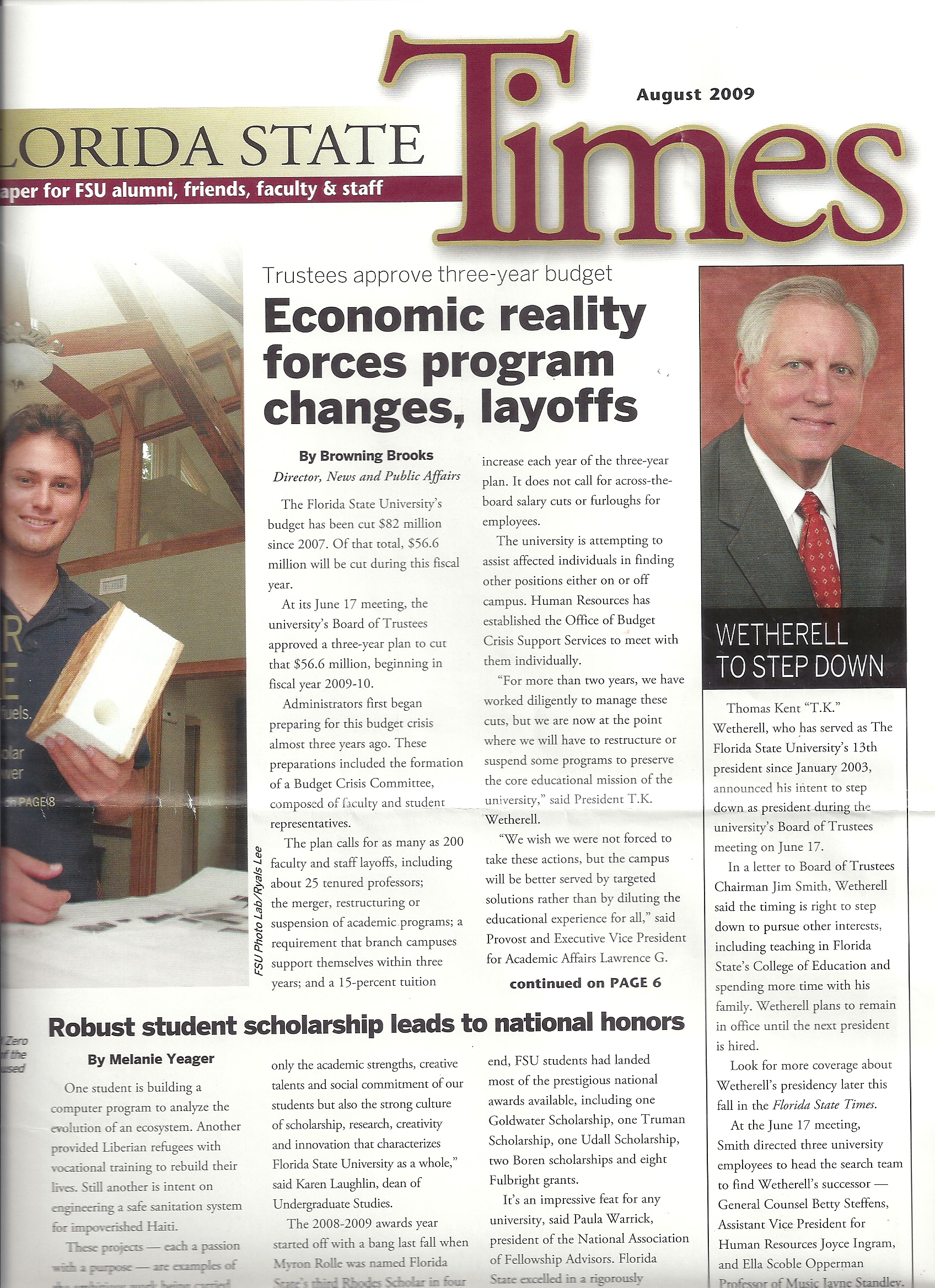The BOT and the UFF-FSU teams met on Tuesday, and the discussion centered on changes the BOT team seeks in Article 13 (Layoff and Recall)(visible in Track Changes). This Zoom public meeting drew 15-20 faculty observers.
Many of the proposed changes are worrisome, and the UFF team was seriously concerned about two, in particular. Section 13.2 specifies that a tenured faculty member in an organizational unit cannot be laid off while non-tenured faculty members remain. Yet, the BOT team proposes adding this phrase: “unless those faculty members without tenure possesses [sic] specific qualifications that better meet the academic needs of the University.” How, we asked, is the new phrase not tantamount to abandoning tenure? And how are “the academic needs of the University” determined? The answer was that in rare instances, a non-tenured individual with particular expertise that is clearly needed and is shared by no one else in the organizational unit would be retained over a tenured individual who lacked that expertise. They offered the example of someone who is the only one able to operate a piece of scientific equipment. A scientist on the UFF team pointed out that equipment is designed to be learned; it would be worth little if it lacked that property. A UFF professor in the humanities pointed out that the definition of “academic need” can change, as happens routinely when the curriculum is redesigned. Another team member pointed out that it is common to have a PhD in one discipline and a departmental home in another; would that person lack the “qualification” that would allow them to retain their job? This proposed wording, we concluded, allows the Administration to define “qualifications” and “academic need” so as to draw a narrow circle around one non-tenured person as the obvious person to remain while tenured faculty are laid off.
The other big issue is the definition of a layoff unit. This definition matters because it is a unit that is laid off, and without a clear definition of “unit,” the administration can be free to cherry-pick individuals. Hence, any changes have to be carefully thought through, and the teams will work towards writing clear language on what constitutes a layoff unit.
Other important issues we discussed centered on (a) how much notice the BOT must give before a layoff, which the BOT proposal shortens; (b) the BOT’s proposal to no longer notify the UFF when they replace laid-off tenured faculty with adjuncts; (c) the BOT’s proposals to no longer help laid-off faculty find alternative University employment and to reduce from two years to one the period during which a laid-off faculty member can be recalled or can be offered retraining; and (d) the BOT’s proposal to eliminate provisions of the layoff article for Specialized Faculty who have been non-renewed, even if they have years left on their contracts.
We noted that many of the BOT proposals center on changing contract language that worked against them in the arbitrator’s determination that in a round of 2008 layoffs the BOT had violated the contract and must reinstate tenured faculty members. The BOT team denied that the arbitrator’s decision informed their proposal.

Above is the Tallahassee Democrat front page. Full coverage can be found here: https://login.proxy.lib.fsu.edu/login?url=https://search-proquest-com.proxy.lib.fsu.edu/docview/762720202?accountid=4840
At the end of the meeting we turned briefly to BOT questions about an article the UFF had opened at the last meeting, and the teams then discussed plans for the next bargaining session.
Bargaining sessions are open to all faculty, and if you would like to attend the next one (Wednesday, June 17, 2:00-4:00), please respond to this message and we will send you the link when we receive it. The UFF is also hosting a forum to answer members’ questions about the Layoff article this Friday, June 12, at 5:00; UFF-FSU President Matthew Lata has sent the link to that Friday meeting; members who need a reminder are free to write us.
Regular updates can be found at our webpage: https://uff-fsu.org/
The key to a strong Collective Bargaining Agreement is a strong membership base, so if you are not a member, please join! There has never been a more important time for us to stand together. http://uff-fsu.org/wp/join/
All best,
Irene Padavic and Scott Hannahs, Co-Chief Negotiators, UFF-FSU



